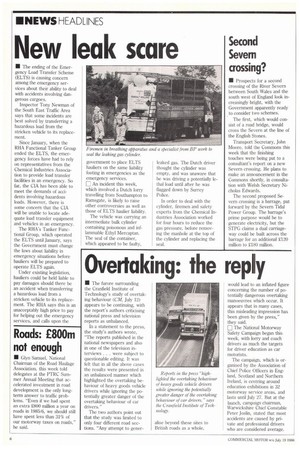New leak scare
Page 8

If you've noticed an error in this article please click here to report it so we can fix it.
• The ending of the Emergency Load Transfer Scheme (ELTS) is causing concern among the emergency services about their ability to deal with accidents involving dangerous cargoes.
• Inspector Tony Newman of the South East Traffic Area says that some incidents are best solved by transferring a hazardous load from the stricken vehicle to its replacement.
Since January, when the RHA Functional Tanker Group ended the ELTS, the emergency forces have had to rely on representatives from the Chemical Industries Association to provide load transfer facilities in an emergency. So far, the CIA has been able to meet the demands of accidents involving hazardous loads. However, there is some concern that the CIA will be unable to locate adequate load transfer equipment and vehicles in an emergency.
The RHA's Tanker Functional Group, which operated the ELTS until January, says the Government must change the laws about liability in emergency situations before hauliers will be prepared to operate ELTS again.
Under existing legislation, hauliers could be held liable to pay damages should there be an accident when transferring a hazardous load from a stricken vehicle to its replacement. The RHA says this is an unacceptably high price to pay for helping out the emergency services, and calls upon the government to place ELTS hauliers on the same liability footing in emergencies as the emergency services.
An incident this week, which involved a Dutch lorry travelling from Southampton to Ramsgate, is likely to raise other controversies as well as those of ELTS haulier liability.
The vehicle was carrying an intermediate bulk cylinder containing poisonous and inflammable Ethyl Mercaptan. The seal of the container, which appeared to be faulty, leaked gas. The Dutch driver thought the cylinder was empty, and was unaware that he was driving a potentially lethal load until after he was flagged down by Surrey Police.
In order to deal with the cylinder, firemen and safety experts from the Chemical Industries Association worked for four hours to reduce the gas pressure, before removing the manhole at the top of the cylinder and replacing the seal.




























































































